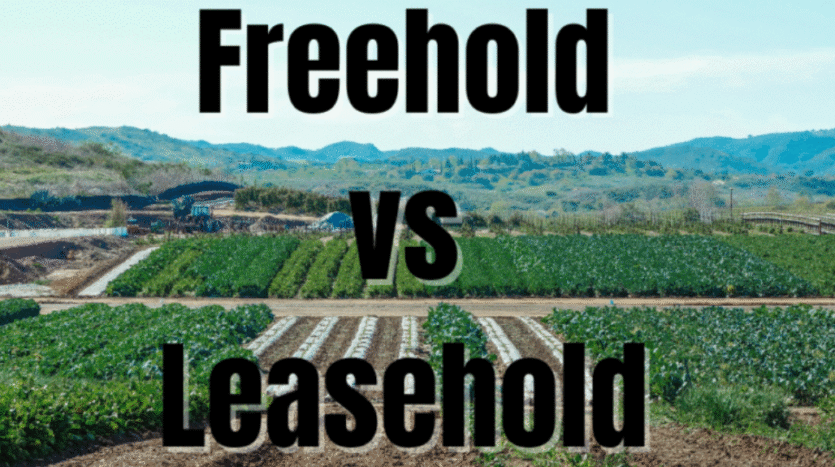Freehold vs Leasehold Land in Kenya: Which Is Better for You?
Choosing between freehold and leasehold land is one of the first and most important decisions when buying property in Kenya. Both tenures are legally recognised, but they offer different rights, costs and long-term implications. This guide explains the differences clearly and helps you pick the tenure that fits your goals.
What do the terms mean?
Freehold (Absolute Proprietorship)
Freehold is the strongest form of land ownership. It gives indefinite ownership of the land (subject to compulsory acquisition or statutory limits). Freehold ownership means you possess the land permanently. Yes, for life. When you buy freehold land, you receive a freehold title deed, a legal document proving that you own the property without any time restrictions.
This form of ownership offers you complete control over your land. You can construct a home, establish a farm, or transfer the property to your heirs without ever worrying about the ownership expiring.
In Kenya, freehold land is most common in rural and agricultural areas and is highly favored by Kenyan citizens because it provides lasting security and independence.
However, owning freehold land also comes with certain responsibilities. You must adhere to local zoning regulations that govern how the land can be used (for instance, some parcels are reserved strictly for farming). Additionally, you’re required to pay land rates and taxes to the respective county government.
Leasehold
Leasehold grants the right to use and possess land for a fixed term under a lease agreement (commonly up to 99 years in Kenya). At lease expiry the land ordinarily reverts to the landlord unless the lease is renewed. Leases can include ground rent, use restrictions and renewal conditions.
Leasehold land for sale in Kenya is more commonly found in urban centers such as Nairobi, Mombasa, and Kisumu. In fact, a large portion of land for sale in Nairobi falls under leasehold tenure because much of the city land is owned by the government.
As a leaseholder, you’re required to pay annual land rent to the national government and land rates to the county government where the property is located.
Quick comparison; pros & cons
Freehold:
- Pros
- Permanent ownership: Ideal for family estates and long-term investors.
- Easier to mortgage and generally preferred by banks and buyers.
- No ground rent (only statutory rates and taxes).
- Cons
- Higher upfront cost in many markets.
- In rare cases non-citizens face limits on freehold ownership. Check nationality rules.
Leasehold:
- Pros
- Lower entry price: Useful for investors with limited capital.
- Flexible for medium-term commercial projects where a fixed-term control is sufficient.
- A long lease (e.g., 99 years) can function practically like ownership for one or two generations.
- Cons
- Declining resale value as the unexpired term shortens; mortgages become harder with less remaining term.
- Possible ground rent, restrictive covenants and renewal uncertainties.
- Conversion to freehold (if available) may be costly or complex.
Practical considerations before you buy
- Check the unexpired lease term.
If buying leasehold, ask how many years remain. Banks and buyers often demand at least 50–80 years remaining for good resale and mortgageability. - Read the lease covenants.
Look for restrictions on building, subletting, alterations and rent review clauses. These materially affect development plans. - Finance and resale impact.
Freehold titles generally attract better mortgage terms. For leasehold, confirm whether your bank will lend against the remaining term. - Nationality and legal limits.
Confirm current rules for foreign buyers. Some categories of land or tenure may have restrictions. - Conversion/renewal routes.
Explore whether the lease contains explicit renewal terms or pathways to convert to freehold. Consult a conveyancing lawyer for likely outcomes and costs.
Which tenure suits your goals?
- Buy freehold if: you want permanent ownership, generational security, easier financing and long-term capital appreciation (recommended for family plots, farm ownership, long-term residential investment).
- Buy leasehold if: you need lower upfront cost, short-to-medium-term control (commercial projects, temporary developments, or when long leases are standard in a location). A 99-year lease can be fine for many investors, but verify resaleability.
- Diaspora investors: freehold is preferable for legacy and inheritance; if leasehold, confirm POA and renewal clauses and ensure professional conveyancing.
Final checklist before purchase
- Obtain official land search and confirm title type (Ardhisasa/eCitizen or Lands Registry).
- For leasehold: verify remaining term and lease covenants.
- For both: order a survey, check for encumbrances, and consult a licensed conveyancing lawyer.
- Confirm mortgage feasibility with lenders if you plan to finance the purchase.
Takeaway
Freehold gives maximum security and simplicity; leasehold can lower the entry price and suit specific development horizons. Your choice should align with your investment horizon, financing needs and inheritance plans. Always verify documents, engage licensed professionals, and get legal advice tailored to the exact title and county rules.






